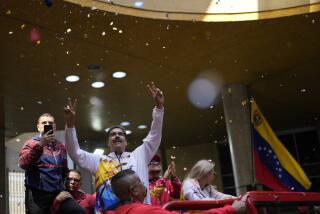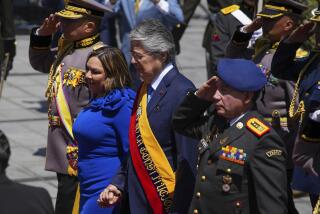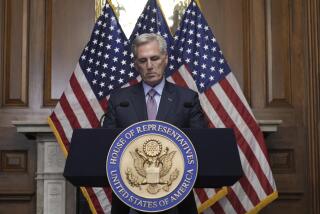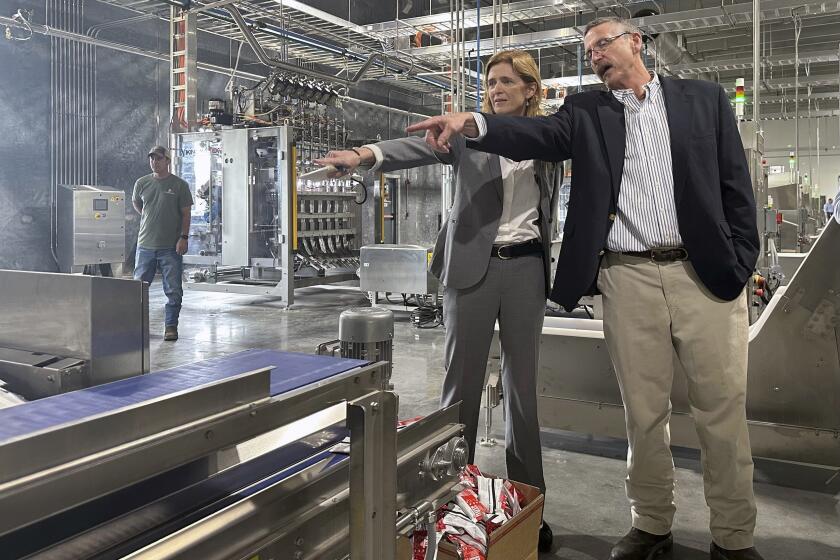Old guard in Cuba keeps reins
Cuba’s parliament signaled Sunday that the status quo of a stunted state-run economy and strained relations with the United States will persist for now as it named Raul Castro to replace his ailing brother, Fidel, as president and chose another aging revolutionary as the nation’s No. 2 leader.
The selection of Raul Castro, 76, to head the Council of State had been widely predicted, as he stood loyally by his brother’s side throughout a 49-year rule. But the appointment of Jose Ramon Machado, 77, as first vice president surprised Cuba analysts who had expected that a younger candidate would be named to bring change to the country’s ossified power structure.
Raul Castro’s first action as president was to propose, with unanimous endorsement of the parliament, that the 81-year-old Fidel Castro retain an influential role in guiding the country.
The new president said he would consult his elder brother on issues of “special transcendence for the future of the nation, especially those having to do with national defense, foreign policy and economic development.”
“I assume this responsibility knowing that as far as the commander in chief is concerned, there is only one. Fidel is Fidel,” Raul Castro told the newly sworn National Assembly. “All of us know he is irreplaceable.”
The appointment of staunch communists offered slim prospects for improved relations with Washington, where officials through 10 presidencies have insisted that Cuba improve its record on human rights before any mending of political ties could occur.
Secretary of State Condoleezza Rice called the leadership change a “significant moment,” but pushed Cubans to undertake “an open and comprehensive dialogue about their country’s future, free of fear and repression.”
“We urge the Cuban government to begin a process of peaceful, democratic change by releasing all political prisoners, respecting human rights and creating a clear pathway toward free and fair elections,” Rice said in a statement released early in the day.
Cubans’ attitudes toward the leadership choices were muted.
In Miami, Cuban exiles viewed the news as confirmation that little will change in their homeland until both Castro brothers are dead.
“We’ve traded one dictator for another, one murderer for another, and the people of Cuba still won’t know what it’s like to be free,” said Ismael Jamide, 55, who left Cuba in 1992. “This gang of delinquents will not make economic change, are you kidding? They know that if they do, the power will slip from their hands.”
Some predicted that life in Cuba would worsen under Raul Castro, saying he lacked the intellect and magnetism of his brother.
“It’s the same dog with a different collar,” said Yolanda Salvador, 67, who has been in the United States 37 years. “Fidel may be decrepit physically, but until his last breath he will make all the decisions in Cuba.”
In Havana, Cuba’s most respected dissident, Oswaldo Paya, called the election “tragicomic” and insisted that the changes “were not the choice of the people.”
Although sweeping reforms are unlikely, Raul Castro has talked about the need for “structural change” to combat widespread corruption and theft from state enterprises. Cuban economists blame those problems for a dysfunctional economy that leaves most Cubans to get by on less than $20 a month and a meager ration of staples.
But outside analysts contend that excessive state control is what stifles incentive and hampers productivity.
Recent debate about how to boost agricultural output has raised hopes of more autonomy at least in the agrarian sector. Some tinkering with agricultural policy is expected as even the most conservative leaders are concerned about Cuba’s dependence on imports for about three-quarters of the island’s food needs. Since the U.S. opened the way for the sale of food and medicine to Cuba in 2000, American farmers have become the island’s biggest supplier of agricultural products.
The new president made passing reference to the need to decentralize decision-making in the agricultural sector but said specific changes needed would be discussed later. A University of Havana professor who asked not to be named said that decentralization may be slow but that it was certain to come.
Another scientific researcher said Raul Castro was reacting in part to growing restlessness among Cuban youths who “do not know the historical context” of the revolution and are impatient for more freedoms and material goods because of exposure to visiting exiles and tourists.
Cubans eager to open their own small businesses and improve their living standards had been hoping Sunday’s parliamentary gathering would usher in more reform-minded figures, such as Vice President Carlos Lage. The 56-year-old physician was credited for guiding the Cuban economy out of the 1990s crisis that ensued after the collapse of the Soviet Union and an end to Moscow’s subsidies.
Fidel Castro rolled back most of those measures that allowed Cubans to run restaurants, repair shops and pensions out of their homes, and Sunday’s choices seemed to convey that another round of self-employment opportunities is unlikely.
Machado, a physician who fought with Castro’s guerrillas and treated their wounded, has served in the Communist Party hierarchy for decades and is known to be a close ally of Raul Castro.
He was responsible in recent years for infusing revolutionary principles into the education system.
Fidel Castro had announced Tuesday that he wouldn’t accept another five-year term as president. He had temporarily ceded power to his brother after falling ill with an intestinal disorder in July 2006 and undergoing complicated surgeries.
He said in his resignation letter that he wasn’t up to the physical demands of the leadership.
The elder Castro was elected to the assembly but failed to show up at its inaugural gathering. Despite his absence, he cast his votes for the new hierarchy. Two fellow members of parliament visited him at an undisclosed location early in the day to collect his ballots, the assembly was told.
Fidel Castro has long condemned all capitalist influences as destructive of the egalitarian nature of Cuban society. Raul Castro, though, has overseen some of the more successful joint-venture enterprises with foreigners in such economic sectors as tourism and mining, which have brought in billions in hard-currency revenue.
Breaking with tradition, Raul Castro showed up for the parliamentary convocation at Havana’s Palace of Conventions wearing a gray suit and tie instead of his usual olive-drab general’s uniform.
Others appointed to the 31-member Council of State, which serves as an executive body and adopts laws between assembly sessions, included several renowned “Raulistas” -- friends and cohorts of the longtime defense minister. Many have a stake in lucrative foreign investment partnerships that have created hotels, airlines and tour companies.
Active and retired generals want to protect their economic turf and probably see the ascent of Raul Castro as the best guarantee of maintaining their power and prosperity.
The first order of business for the assembly was the reelection of its long-serving speaker, Ricardo Alarcon. The 70-year-old former U.N. ambassador was the only candidate nominated, as Raul Castro was for head of state.
In this 50th year of the Castro regime, many Cubans have lost interest in a political system they believe excludes them.
“We need social, economic and political change, but we won’t get it,” said Juan Martin, a merchant in the Miramar section of the capital as he browsed at an international outdoor book fair near the El Morro fortress that guards Havana harbor. “Nothing will change.”
“People want an opening, but there are no political options to communism, no other parties,” said Arturo, a chauffeur who, like many Cubans asked about their political views, did not want to give his last name.
--
carol.williams@latimes.com
Bustillo reported from Miami and Williams from Las Vegas. A Times staff writer in Havana contributed to this report.
--
(BEGIN TEXT OF INFOBOX)
Levels of power
Cuba is a socialist state governed by the nation’s Communist Party. The Cuban Constitution, adopted in 1976, establishes the party as the highest authority in governmental and social affairs. Its constituent parts:
National Assembly
* 614 members elected for five-year terms
* Selects its own officers
Council of State
* 31 members elected by the Assembly
* President of the council is also head of state/government
* Supervises all state and government bodies and makes government appointments, including judges of the Supreme Court
* Ratifies votes of the Assembly
* Issues laws when the Assembly is not meeting
Council of Ministers
* Highest executive and administrative body
* 38 members include most of the Council of State
* Serves as the nation’s Cabinet
* Council president is head of government
Local governments
* 14 provinces and about 170 municipalities
* Municipal assembly delegates elected for 2A-year terms
* Municipal delegates elect representatives to provincial assemblies, for 2A-year terms
* Communist Party and national government exercise control over municipal and provincial activities
* Local governments lack funding and therefore can do little to enact proposals
Sources: Europa World Year Book 2006, World Book Encyclopedia, Cuban Constitution, Encyclopedia Britannica
--
New leaders
President
Name: Raul Castro
Titles: Elected president of Council of State and Council of Ministers on Sunday; still minister of the Revolutionary Armed Forces and second secretary of Communist Party.
Born: June 3, 1931, in Cuba’s Oriente province
Before the revolution: Attended Roman Catholic schools, studied administration at University of Havana. Fought alongside older brother Fidel in effort to topple President Fulgencio Batista, eventually leading 4,000 troops on a second front in eastern Cuba.
After the revolution: Named head of armed forces late in 1959. Served in the early decades as deputy prime minister, first deputy prime minister and first vice president, putting him first in line of succession. Named Cuba’s provisional president and head of Communist Party by Fidel Castro on July 31, 2006.
Family: Married to Vilma Espin, who fought alongside him. Before she died on June 18, Espin was head of Communist Party-linked women’s organization and often served as Cuba’s first lady. They had four children and numerous grandchildren.
First vice president
Name: Jose Ramon Machado
Title: Elected Cuba’s first vice president on Sunday.
Born: Oct. 26, 1930
Before the revolution: As a young doctor, he joined Fidel and Raul Castro as a guerrilla in the Sierra Maestra mountains during the insurgency against Batista. He looked after the health of the rebel army, which took power in 1959.
After the revolution: A hard-line communist ideologue and old-guard revolutionary, he has long been a prominent member of the ruling Communist Party’s Central Committee and its political bureau. Seen as Raul Castro’s right-hand man, he has been responsible for supervising Cuba’s international education programs since Fidel Castro fell ill and delegated powers to his brother in July 2006. His duties include integrating socialist ideas into education programs.
Sources: Associated Press, Reuters
More to Read
Start your day right
Sign up for Essential California for news, features and recommendations from the L.A. Times and beyond in your inbox six days a week.
You may occasionally receive promotional content from the Los Angeles Times.







